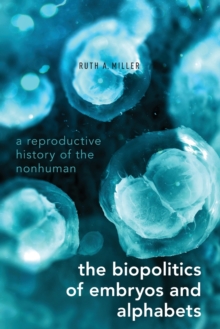Description
| Product ID: | 9780190638368 |
| Product Form: | Paperback / softback |
| Country of Manufacture: | US |
| Title: | The Biopolitics of Embryos and Alphabets |
| Subtitle: | A Reproductive History of the Nonhuman |
| Authors: | Author: Ruth A. Miller |
| Page Count: | 200 |
| Subjects: | Feminism and feminist theory, Feminism & feminist theory, Ethical issues: scientific, technological and medical developments, Political science and theory, Human rights, civil rights, Embryology, Medical microbiology and virology, Bioethics, Biotechnology, Ethical issues: scientific & technological developments, Political science & theory, Human rights, Embryology, Medical microbiology & virology, Bio-ethics, Biotechnology |
| Description: | In recent decades there has been an explosion in work in the social and physical sciences describing the similarities between human and nonhuman as well as human and non-animal thinking. In this book, Ruth Miller argues that these types of phenomena are also useful models for thinking about the growth, reproduction, and spread of political thought and democratic processes. By shifting her level of analysis from the politics of self-determining subjects to the realm of material environments and information systems, Miller asks what might happen if these alternative, nonhuman thought processes become the normative thought processes of democratic engagement. Biopolitics and posthumanism have been passé theories in the academy for a while now, standing on the unfashionable side of the fault line between biology and liberal thought. These days, if people invoke them, they do so a bit apologetically. But, as Ruth Miller argues, we should not be so quick to relegate these terms to the scholarly dustbin. This is because they can help to explain an increasingly important (and contested) influence in modern democratic politicsthat of nostalgia. Nostalgia is another somewhat embarrassing concept for the academy. It is that wistful sense of longing for an imaginary and unitary past that leads to an impossible future. And, moreover for this book, it is ordinarily considered bad for democracy. But, again, Miller says, not so fast. As she argues in this book, nostalgia is the mode of engagement with the world that allows thought and life to coexist, productively, within democratic politics. Miller demonstrates her theory by looking at nostalgia as a nonhuman mode of thought, embedded in biopolitical reproduction. To put this another way, she looks at mass democracy as a classically nonhuman affair and nostalgic, nonhuman reproduction as the political activity that makes this democracy happen. To illustrate, Miller draws on the politics surrounding embryos and the modernization of the Turkish alphabet. Situating this argument in feminist theories of biopolitics, this unusual and erudite book demonstrates that nostalgia is not as detrimental to democratic engagement as scholars have claimed. |
| Imprint Name: | Oxford University Press Inc |
| Publisher Name: | Oxford University Press Inc |
| Country of Publication: | GB |
| Publishing Date: | 2017-09-14 |


